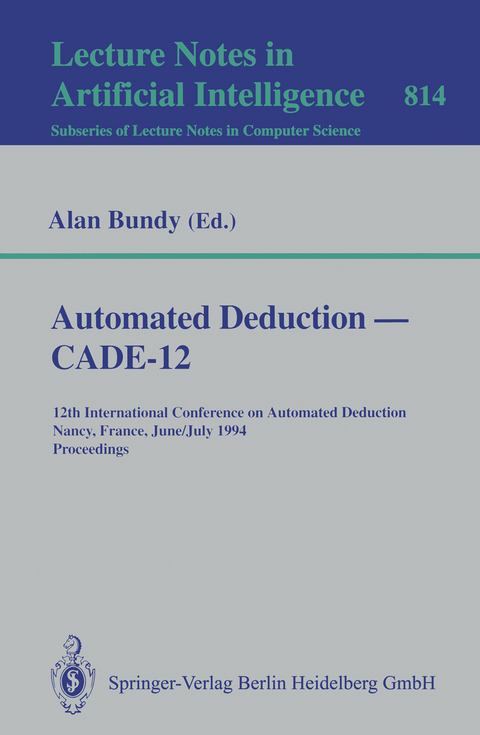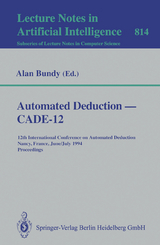Automated Deduction — CADE-12
Springer Berlin (Verlag)
978-3-540-58156-7 (ISBN)
The 67 papers presented were selected from 177 submissions and document many of the most important research results in automated deduction since CADE-11 was held in June 1992. The volume is organized in chapters on heuristics, resolution systems, induction, controlling resolutions, ATP problems, unification, LP applications, special-purpose provers, rewrite rule termination, ATP efficiency, AC unification, higher-order theorem proving, natural systems, problem sets, and system descriptions.
The crisis in finite mathematics: Automated reasoning as cause and cure.- A divergence critic.- Synthesis of induction orderings for existence proofs.- Lazy generation of induction hypotheses.- The search efficiency of theorem proving strategies.- A method for building models automatically. Experiments with an extension of OTTER.- Model elimination without contrapositives.- Induction using term orderings.- Mechanizable inductive proofs for a class of ? ? formulas.- On the connection between narrowing and proof by consistency.- A fixedpoint approach to implementing (Co)inductive definitions.- On notions of inductive validity for first-order equational clauses.- A new application for explanation-based generalisation within automated deduction.- Semantically guided first-order theorem proving using hyper-linking.- The applicability of logic program analysis and transformation to theorem proving.- Detecting non-provable goals.- A mechanically proof-checked encyclopedia of mathematics: Should we build one? Can we?.- The TPTP problem library.- Combination techniques for non-disjoint equational theories.- Primal grammars and unification modulo a binary clause.- Conservative query normalization on parallel circumscription.- Bottom-up evaluation of Datalog programs with arithmetic constraints.- On intuitionistic query answering in description bases.- Deductive composition of astronomical software from subroutine libraries.- Proof script pragmatics in IMPS.- A mechanization of strong Kleene logic for partial functions.- Algebraic factoring and geometry theorem proving.- Mechanically proving geometry theorems using a combination of Wu's method and Collins' method.- Str?ve and integers.- What is a proof?.- Termination, geometry and invariants.- Ordered chaining for totalorderings.- Simple termination revisited.- Termination orderings for rippling.- A novel asynchronous parallelism scheme for first-order logic.- Proving with BDDs and control of information.- Extended path-indexing.- Exporting and reflecting abstract metamathematics.- Associative-commutative deduction with constraints.- AC-superposition with constraints: No AC-unifiers needed.- The complexity of counting problems in equational matching.- Representing proof transformations for program optimization.- Exploring abstract algebra in constructive type theory.- Tactic theorem proving with refinement-tree proofs and metavariables.- Unification in an extensional lambda calculus with ordered function sorts and constant overloading.- Decidable higher-order unification problems.- Theory and practice of minimal modular higher-order E-unification.- A refined version of general E-unification.- A completion-based method for mixed universal and rigid E-unification.- On pot, pans and pudding or how to discover generalised critical Pairs.- Semantic tableaux with ordering restrictions.- Strongly analytic tableaux for normal modal logics.- Reconstructing proofs at the assertion level.- Problems on the generation of finite models.- Combining symbolic computation and theorem proving: Some problems of Ramanujan.- SCOTT: Semantically constrained otter system description.- Protein: A PROver with a Theory Extension INterface.- DELTA - A bottom-up preprocessor for top-down theorem provers.- SETHEO V3.2: Recent developments.- KoMeT.- ?-MKRP: A proof development environment.- LeanT A P: Lean tableau-based theorem proving.- FINDER: Finite domain enumerator system description.- Symlog automated advice in Fitch-style proof construction.- KEIM: A toolkit for automated deduction.- Elf: Ameta-language for deductive systems.- EUODHILOS-II on top of GNU epoch.- Pi: An interactive derivation editor for the calculus of partial inductive definitions.- Mollusc a general proof-development shell for sequent-based logics.- KITP-93: An automated inference system for program analysis.- SPIKE: A system for sufficient completeness and parameterized inductive proofs.- Distributed theorem proving by Peers.
| Erscheint lt. Verlag | 8.6.1994 |
|---|---|
| Reihe/Serie | Lecture Notes in Artificial Intelligence | Lecture Notes in Computer Science |
| Zusatzinfo | XVI, 852 p. |
| Verlagsort | Berlin |
| Sprache | englisch |
| Maße | 155 x 235 mm |
| Gewicht | 1073 g |
| Themenwelt | Informatik ► Theorie / Studium ► Künstliche Intelligenz / Robotik |
| Mathematik / Informatik ► Mathematik ► Logik / Mengenlehre | |
| Schlagworte | AI-Logics • automated deduction • automated reasoning • Automatisches Beweisverfahren • Automatisches Schliessen • Automatisches Schließen • Beweisen • Complexity • Deduktionssystem • grammar • Hardcover, Softcover / Informatik, EDV/Informatik • HC/Informatik, EDV/Informatik • Heuristics • KI-Logiken • Lambda Calculus • Logic Programming • Logische Programmierung • Logisches Prorammieren • proving • Term-Ersetzung • Term Rewriting • theorem proving • Variable |
| ISBN-10 | 3-540-58156-1 / 3540581561 |
| ISBN-13 | 978-3-540-58156-7 / 9783540581567 |
| Zustand | Neuware |
| Haben Sie eine Frage zum Produkt? |
aus dem Bereich




